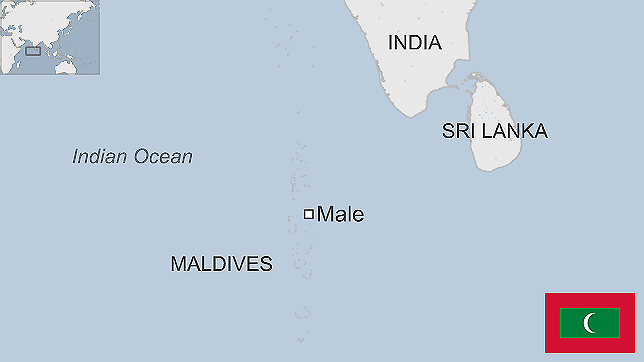Q&A: Maldives presidential election re-run
- Published
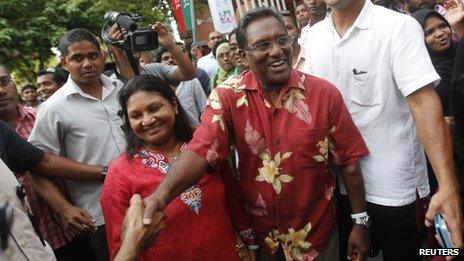
Incumbent Mohamed Waheed (C) meets supporters in Male
The Maldives had planned fresh presidential polls on Saturday after the Supreme Court annulled the results of the elections on 7 September amid allegations of electoral fraud.
This is the second attempt to elect the head of the country since former President Mohamed Nasheed was forced to step down in 2012 under controversial circumstances which he described as a coup. Mr Nasheed was succeeded by then Vice-President Mohamed Waheed, who denies that a coup took place.
The Maldives saw its first free presidential elections in 2008. Before then it had been ruled for three decades by Maumoon Abdul Gayoom, still seen as wielding considerable political influence.
However, election commission head Fuwad Thowfeek was obliged to cancel voting on Saturday, hours before it was due to begin, after police prevented election officials distributing voting materials, citing a court order requiring all candidates to approve the voter register. Only Mr Nasheed has so far done this.
Who won the first round?
Mohamed Nasheed won the 7 September polls with 45% of the vote. Abdulla Yameen, the half-brother of former ruler Maumoon Abdul Gayoom, came a distant second with 25%.
In third place was prominent businessman Gasim Ibrahim with 24%, while the incumbent president, Mohamed Waheed, only polled 5%.
Since no candidate cleared the 50% threshold, Mr Nasheed and Mr Yameen were to face off in the second round.
Why was the first round annulled?
The Supreme Court put off the second round and then annulled the results from the first after Gasim Ibrahim complained of irregularities.
He alleged that problems with the electoral roll allowed ineligible voters to cast their ballots. The court's verdict, external, supported by four of its seven judges, cited a confidential police report as confirming that more than 5,600 votes were ineligible and that some of them were cast in the name of dead people and underage children.
The Election Commission had earlier dismissed these allegations. Local and international observers had also described the first round of voting as free and fair.
Who are the candidates?
Three candidates are contesting the fresh poll: former President Mohamed Nasheed, former President Gayoom's half-brother Abdulla Yameen and business tycoon Gasim Ibrahim. Incumbent President Mohamed Waheed has pulled out of the race.
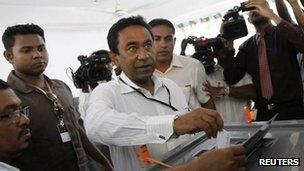
Abdulla Yameen (C) heads the second-largest party in the Maldives
Mr Nasheed leads the Maldivian Democratic Party (MDP), the single largest party with the highest number of registered members. He became the Maldives' first democratically elected president in 2008.
Former President Gayoom's half-brother Abdulla Yameen is standing for the Progressive Party of Maldives (PPM), the second-largest party both inside and outside the parliament.
Gasim Ibrahim is the presidential candidate of the Jumhooree Party. The prominent businessman heads the Villa Group of companies, described as one of the largest private conglomerates in the Maldives. He is also said to be popular for his philanthropic work.
What is the atmosphere surrounding the fresh polls?
The decision to order a re-run has prompted concerns both at home and abroad, while preparations for the run-off were mired in controversy until the last minute.
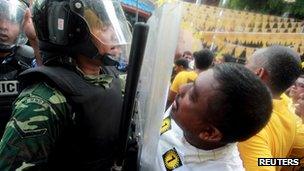
Supporters of Mohamed Nasheed at a protest in Male on 27 September
Less than a day before polls were due to open, election chief Fuwad Thowfeek cast doubt on whether they would be going ahead.
Only one candidate, Mohamed Nasheed, had endorsed the revised electoral register. The two others could not be reached even though officials called, texted and even visited their homes, Mr Thowfeek said.
After announcing early on Saturday that the election would go ahead regardless, Mr Thowfeek then had to call it off, as the electoral commission filled with police, who prevented any voting materials being distributed.
No violence has been reported but tensions came to a climax hours before the first round was annulled, when masked men set fire to the studios of Raajje TV. The station is known to support Mohamed Nasheed.
President Waheed expressed doubts that the 19 October polls would be free and fair, and spoke of "division and vengeance" in the Maldives.
The leading candidate, Mohamed Nasheed, criticized the court's decision, saying it had overturned "the only credible election" in Maldivian history.
Continued instability in the tiny island nation has prompted fears about falling revenues from the vital tourism industry, which accounts for almost 30 per cent of the country's GDP.
What do the media say?
Most commentators in the Maldives have opposed the Supreme Court's decision which nullified the first round. By and large, they also see no truth in Mr Gasim's allegation of electoral fraud. The media are also critical over the "lack of trust" between government agencies and the judiciary.
What are the key issues of campaigning?
Candidates have been largely focusing on religion, nationalism, economy and education in their election campaigns.
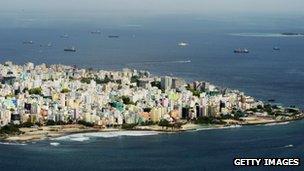
Tourism forms a large part of the Maldives' economy
Mr Nasheed's party is focusing on economic development through reforms and tourism. His Maldivian Democratic Party's manifesto pledges tax reform, development projects and the setting up of a national development bank.
Other candidates are using religion as a political tool to woo voters. Mr Gasim's manifesto proposes to strengthen Islam in the Maldives, including the establishment of an Islamic university and making the Koran a mandatory school subject. Mr Gasim has also pledged to pursue oil exploration, increase taxes on the wealthy and provide laptops for students.
Mr Yameen has taken a strong position on law and order, campaigning in favour of implementing the death penalty and calling for harsher prison sentences.
BBC Monitoring, external reports and analyses news from TV, radio, web and print media around the world. For more reports from BBC Monitoring, click here. You can follow BBC Monitoring on Twitter , externaland Facebook, external.
- Published12 October 2013
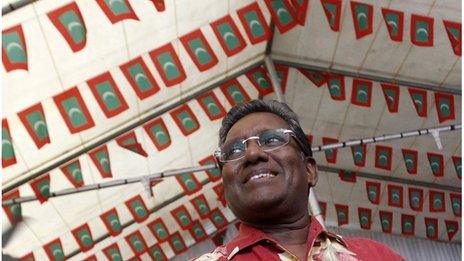
- Published8 October 2013
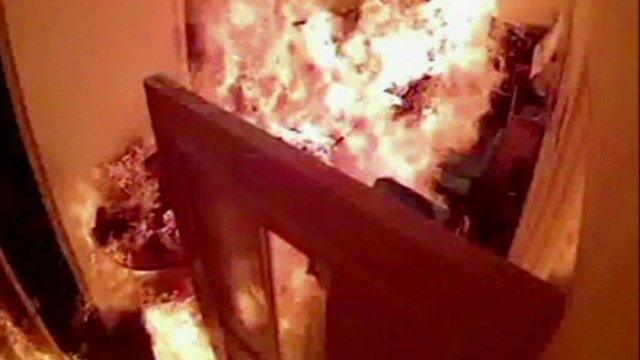
- Published10 March
